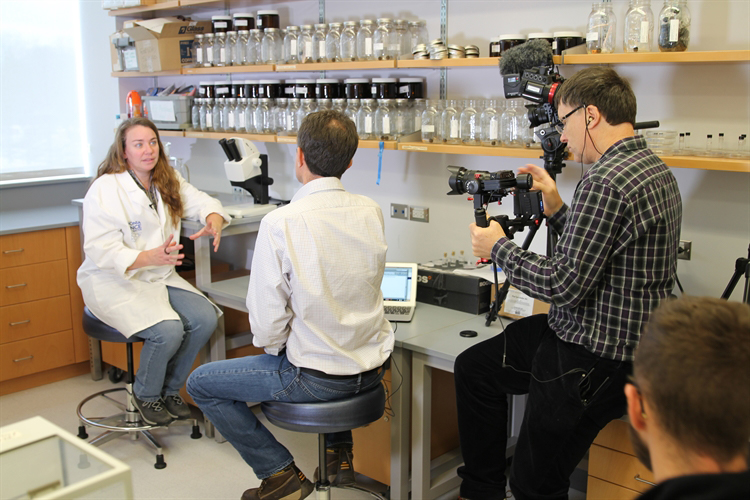
water reach a worldwide audience. Photo courtesy of Fredonia Campus Report.
VICTOR SCHMITT-BUSH
Assistant News Editor
The issue of plastic pollution is starting to be taken seriously, and it’s partly thanks to Sherri Mason, the chair of Fredonia’s Geology and Environmental Sciences department.
As an affiliate of Orb Media, the non-profit activist organization against plastic pollution, Mason was prompted to begin a research project over winter break. It steamrolled into a nationwide story that caught the attention of BBC News.
On March 15, 2018, BBC News author, David Shukman, posted an online article titled “Plastic particles found in bottled water.” The entire article was about Mason and her research.
“It was really exciting because I was at a conference on plastic pollution when the story broke out,” said Mason. “I didn’t sleep for some time. This is what I was doing the whole winter break. So while you guys were home celebrating the holidays, I hired two of my graduated students who both have their bachelor’s degree to help me with my research.”
They began by collecting a total of 259 plastic bottles of water that were provided to them by Orb Media. The samples were all bought from a number of organizations spanning across nine countries, including Nestle, IBWA and Poland Spring.
“This is what’s nice about working with Orb,” said Mason. “They did a market analysis, and they found the top selling brands within given markets and those were the ones that we processed. They collected all of the samples and sent them to us.”
The samples were divided by the amount of water and not strictly by the number of bottles bought, because the standard size per bottle varies from country to country.
“For science, we processed generally ten bottles from each lot,” said Mason. “I say generally ten because in the United States, all of our water usually comes in 500 milliliters. In different countries, two liters is standard, one liter is standard, etc. They have very random things.”
Mason attributed the bulk of her success in public outreach to Orb’s dedicated peer review and networking staff.
“That’s how [BBC] became aware of the study,” she said. “In terms of the BBC, Orb contacts news agencies, and BBC came on as the lead news agency. They were the first ones to get to break the story, and from there, they have these arms that reach out, and everyone else gets to reach them.”
She also mentioned that Orb places a lot of importance on the integrity of its work. She said that the results of sample data that she and her research team found would be sent by Orb to the companies it was testing bottled water on. This forced these companies to accept the reality of the team’s research.
“I love the way that they went about it,” said Mason. “Basically, every brand that we processed, they got an advanced copy of the report 10 days before publication. The intent was, ‘This is our science. What do you say back to it?’”
Eventually, the growing prevalence of Mason and her research would pressure even the World Health Organization to begin a human health impact study, which, according to her, is no easy task.
She explained that she was at a plastic pollution conference when a European Union commissioner came up to her and thanked her for her work.
“He found me at one of these discussions and was like, ‘I just want to thank you.’ He said, ‘We had issues on a report in January to the World Health Organization asking for a human health impact study to be done.’”
The commissioner explained to her that when the World Health Organization responded to their plea, it said that the company didn’t have the money or the time.
The commissioner thanked Mason and said,“[When your report came out], they did what we asked them to do in January. It’s because of you that change is happening on this planet.”
“And that’s a big part of why I love doing what I do. I want to leave this place a better place than what it was when I started here,” Mason concluded.
